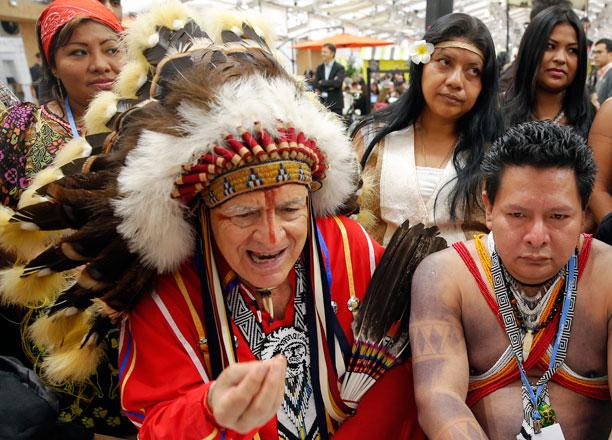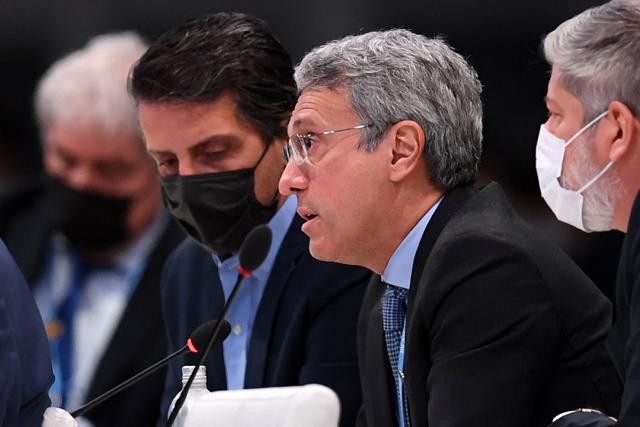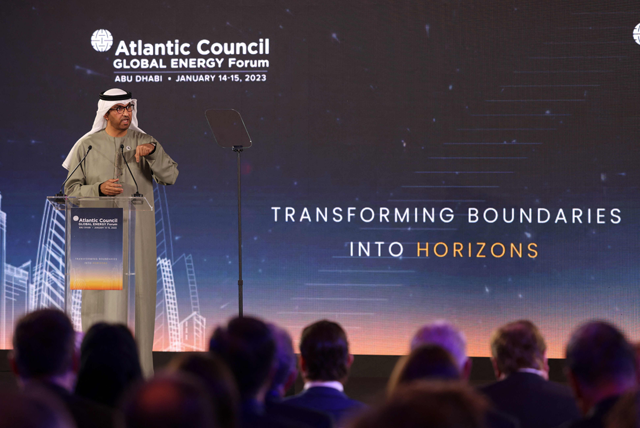You are here
Rich blamed as world seeks climate pact
By AFP - Dec 02,2015 - Last updated at Dec 02,2015

Hereditary chief Phil Lane jr from Dakota (left) and Candido Mezua, representative of the indigeneous of Panama, give a press conference on deforestation at the COP21, the United Nations Climate Change Conference Wednesday, in Le Bourget, north of Paris (AP photo)
LE BOURGET, France — Campaigners on Wednesday pointed a finger at the rich for dangerous warming of the planet as negotiators from 195 nations fought a grinding battle over the text of a pact to avert climate disaster.
The rich-poor divide, which has for decades bedevilled climate talks, re-emerged on the sidelines of the UN conference in Paris, where participants reported mounting frustration over progress towards the post-2020 deal.
The UN talks aim to seal a deal that would slash carbon emissions — which come mainly from burning fossil fuels such as coal and oil — and deliver hundreds of billions of dollars in aid for climate-vulnerable countries.
It is the latest chapter in a 25-year diplomatic saga marked by spats over how to share the burden of reducing emissions, and hobbled by a negotiation system of huge complexity.
Behind their vows of support, many leaders have often preferred the short-term benefits of burning cheap and dependable fossil fuels to power prosperity, ignoring the consequences of carbon pollution.
British charity Oxfam issued a study saying the richest 10 per cent of people produce half of Earth's climate-harming fossil-fuel emissions, while the poorest half contribute a mere 10 per cent.
An average person among the richest 1 per cent emits 175 times more carbon than his or her counterpart among the bottom 10 per cent, the charity said.
'Rich should lead
the way'
"Rich, high emitters should be held accountable for their emissions, no matter where they live," Oxfam climate policy head Tim Gore said.
"But it's easy to forget that rapidly developing economies are also home to the majority of the world's very poorest people and while they have to do their fair share, it is rich countries that should still lead the way," he said in a statement.
Developing countries say the West has polluted for much longer and should shoulder a bigger obligation for cutting back.
They are also calling on rich nations to make good on a 2009 pledge to muster $100 billion (94 billion euros) a year in climate aid by 2020.
The funds would help vulnerable states shift to less-polluting renewable energy and shore up defences against climate impacts such as sea level rise, droughts and storms.
More than 150 world leaders gathered for the 12-day summit on Monday to launch the talks, seeking to build momentum for the tough negotiations ahead with lofty rhetoric about the urgency of the task.
"The future is one that we have the power to change, right here, right now," Obama told his fellow leaders.
But negotiators at the UN talks in Paris remain deeply split over the key issues of finance for developing nations and burden-sharing, said a European negotiator who asked not to be named, as they pore over a hugely complex 54-page draft text riddled with undecided clauses.
"There is a growing frustration," the source said, with bureaucrats refusing to budge on the wording of small sections of a draft text but "some progress" being made elsewhere.
'Quite messy now'
"It's quite messy now," agreed Greenpeace climate campaigner Li Shuo, who has observer status in the talks, with more than 10 smaller groups trying to whittle down the draft into an intelligible blueprint.
"You had contact groups, spin-off groups, informal informals, huddles," he said. "At some point, we definitely need to switch gear."
The negotiators have been tasked with thrashing out an overall blueprint that can be handed over to ministers by Saturday.
A final deal, which needs the assent of every participant, is due by the conclusion of the Paris conference December 11, though such negotiations are often marked by missed deadlines and fraught all-night sessions.
The goal is to curb the planet's temperature rise to below, or well below, 1.5º or 2ºC above pre-Industrial Revolution levels.
But the legal experts say there is a gaping hole in the draft under discussion, with no mention yet of reducing international support for fossil fuels.
Climate campaigners 350.org said in a report that the number of major financial institutions that had stopped investing in fossil fuels had shot up to 500 from 181 in a little over a year.
"Investors are reading the writing on the wall," it said.
Friends of the Earth said many banks were still ploughing into coal mining, however, despite proclaiming themselves climate leaders.
Related Articles
GLASGOW — British Prime Minister Boris Johnson on Friday appealed to richer countries to place more "cash on the table" to secure a climate
GLASGOW — Britain on Saturday urged compromise among feuding COP26 delegates as it touted a "balanced" package to help avert the worst effec
ABU DHABI — The president of this year's COP28 climate talks, who heads a major oil company, on Saturday urged a focus on lower emissions to













